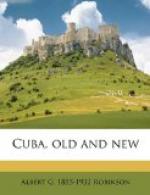This people cannot hesitate between the wealth of Spain and the liberty of Cuba. Its greatest crime would be to stain the land with blood without effecting its purposes because of puerile scruples and fears which do not concur with the character of the men who are in the field, challenging the fury of an army which is one of the bravest in the world, but which in this war is without enthusiasm or faith, ill-fed and unpaid. The war did not begin February 24; it is about to begin now.
The war had to be organized; it was necessary to calm and lead into the proper channels the revolutionary spirit always exaggerated in the beginning by wild enthusiasm. The struggle ought to begin in obedience to a plan and method more or less studied, as the result of the peculiarities of this war. This has already been done. Let Spain now send her soldiers to rivet the chains on her slaves; the children of this land are in the field, armed with the weapons of liberty. The struggle will be terrible, but success will crown the revolution and the efforts of the oppressed.
(Signed) MAXIMO GOMEZ, General-in-Chief.
Such an address doubtless savors of bombast to many Americans, but in the history of political and military oratory in their own land they can find an endless number of speeches that, in that particular quality, rival if they do not surpass it. The Cuban situation was desperate, and the Cuban attitude was one of fixed determination. Productive industry was generally suppressed, and much property was destroyed, by both Cubans and Spaniards. This necessarily threw many out of employment, and drove them into the insurgent ranks. The Cubans are a peaceful people. All desired relief from oppressive conditions, but many did not want war. While many entered the army from patriotic motives, many others were brought into it only as a consequence of conditions created by the conflict. The measures adopted were severe, but decision of the contest by pitched battles was quite impossible. The quoted figures are somewhat unreliable, but the Spanish forces outnumbered the Cubans by at least five to one, and they could obtain freely the supplies and ammunition that the Cubans could obtain only by filibustering expeditions. The Cubans, therefore, adopted a policy, the only policy that afforded promise of success. Spain poured in fresh troops until, by the close of 1895, its army is reported as numbering 200,000 men.
The Cubans carried the contest westward from Oriente and Camaguey, through Santa Clara, and into the provinces of Matanzas, Havana, and Pinar del Rio.
[Illustration: ALONG THE HARBOR WALL Havana]




